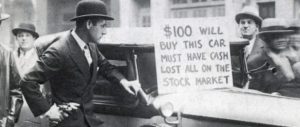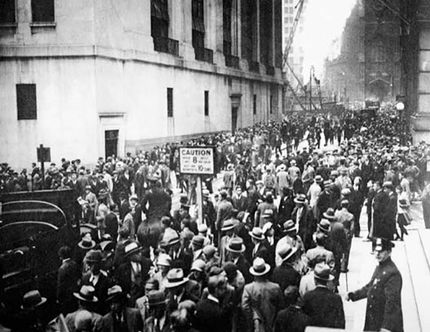ENSICLOPEDIA – The Day the Bubble Burst examines one of the greatest financial disasters—the 1929 stock market crash—through the eyes of those involved.
The end of World War I created a hunger for expansion, which, in turn, grew into an obsession with wealth and excess. Thus, the 1920s were “the Roaring 20s”, as the U.S. became the world’s leading financial power; new technologies came into play, and Western stock prices rose to unprecedented levels. With such a successful economy, it was impossible not to feel that the worst days were well and truly over.
On October 29, 1929, a decade of glamor, glitter, and progress came to a sudden end with a massive financial crash. With Black Tuesday’s fall of the New York Stock Exchange came a number of destructive ramifications—from bank closures to soaring unemployment rates—which all paved the way for the decade-long Great Depression.
Since early morning Homer Dowdy had been delivering telegrams along his route in Flint. In the past four hours he had dropped off more demands for margin than he had delivered altogether since Black Thursday.
Throughout the city every other available mailman was engaged in a similar task.
It was the same in each city, town, and hamlet in America. The flood of telegrams had increased as the market crisis escalated.
In Flint, most of the margin demands were to cover the tumbling value of auto stocks.
Hundreds of employees in the body-building and assembly plants that surrounded the city had invested during the summer of 1929 in such shares. Many had bought individual $1,000 blocks for the minimum 10 percent deposit.
Others formed consortiums, the members putting up $1,000 between them to buy $10,000 worth of stock in GM or Chrysler. Housewives had bought on margin. Businessmen extended their credit to speculate.
Seventeen-year-old Ed Love, whose uncle, Grant Brown, was president of the Union Industrial Bank, had recently asked his father whether he was worth a million dollars. His father said he was. And he was—on paper.
The boy’s father was one of the first of the city’s “margin millionaires” to be wiped out.
Others followed.
By mid morning, Flint doctors—in common with physicians right across America—were having to treat cases of stroke and even heart attacks, brought on by the tension of “being caught in the market.”
On Saginaw Street, where Billy Durant had first ridden a mechanically propelled cart, Homer Dowdy observed men actually “wailing like lunatics, saying they wished the motor car had never been invented. They were ruined from their losses in GM.”
Outside brokerage offices he saw lines of “white-faced men who already knew what misery lay ahead.”
Dowdy had his own problems. His wife, Gladys, was now close to death; the burden of nursing a dying woman and bringing up three small children was taxing his resources. The world outside had come to mean less and less to the shy, lonely mailman locked into his own tragedy.
Then Dowdy heard something that jerked him back into that world and made him temporarily abandon his deliveries.
Someone ran past him shouting the Union Industrial Bank had closed its doors.
Jolan and Steve Vargo saw the doors shut when they were still a couple of hundred yards away from them. They started to run, joining the many others converging on the building.
Married just ten days, the young couple had put off going to the bank until now because “we had so many other things to do.”
And Steve had been “too busy” to ask Goldberger whether the attorney had learned why Jolan’s brother had been unable to withdraw his share of the trust fund.
Today, after lunch, Jolan and Steve had decided to go to the bank and settle what Steve assured his bride was a simple matter.
They arrived to find that the doors were firmly locked, a full hour before normal closing time. Steve had a ready explanation.

Several of his friends at work had received margin calls. He sympathized with them. Privately, he felt relieved he had the foresight to have placed his money in the bank.
Steve told Jolan the doors had undoubtedly been closed “on account of the trouble in New York.”
He led his wife away from the Union Industrial with the promise they would return another day; in the meantime, he insisted, their money was safer in the bank than anywhere.
It had been just before two o’clock when Frank Montague had finally decided what he must do. All morning he had followed news of the collapse in New York being relayed by telephone to Ivan Christensen.
At one-thirty Montague had estimated they owed the bank “around three million.”
Montague was short—and not for the first time—in his calculations. All told, he and his fellow conspirators had looted the bank for $3,592,000.
For thirty minutes Montague had agonized over what was the best course of action open to him. He had come to believe he had been “duped by the others. I had no idea we were in so deep.”
Montague decided there was no point in appealing to his coconspirators again. The moment had come.
As purposefully as he could, he walked the few feet to the desk of bank president Grant Brown.
In a halting voice Montague requested a private word with the president.
Brown led Montague into the directors’ room—where for so many months the “league of gentlemen” had planned their strategy at the strictly unofficial and very private late evening “board meetings.”
Montague began to confess.
Brown stopped him the moment Montague mentioned embezzling.
The president walked back into the bank.
The few customers there were quickly shown out. It was then that the bank doors were locked.
Standing in the center of the main banking hall, the stern-faced Grant Brown ordered all those who knew anything of the embezzlement to come to the directors’ room.
He rejoined Montague.
Behind him, Ivan Christensen quietly replaced the telephone receiver which, for almost four continuous hours, he had held to his ear.
Source: The Archive




